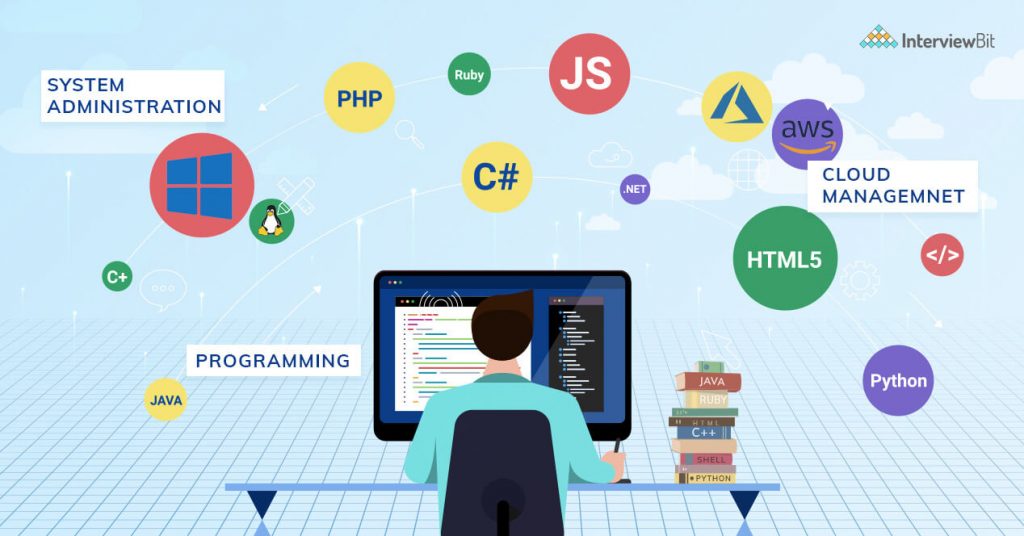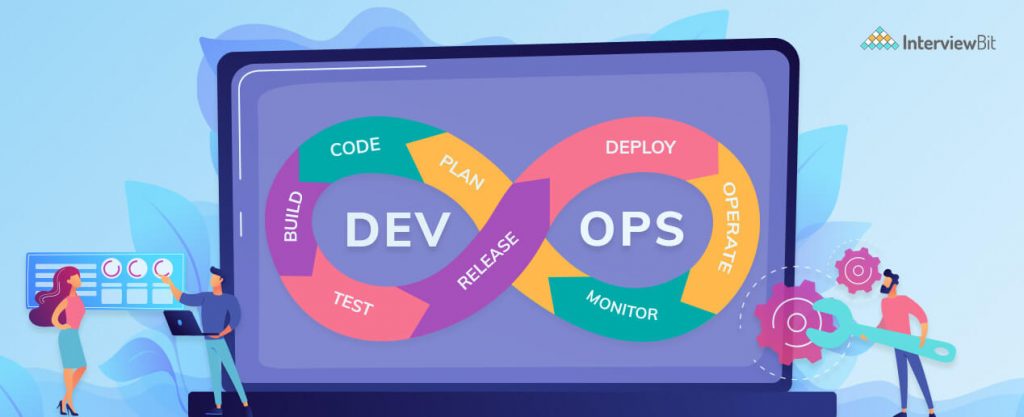“Are you with the coding team?”
“Or Are you with the operations team?”
There must be numerous questions put up to you or come to your mind when you are starting as a DevOps Engineer. These questions are much obvious as DevOps engineer roles encompass a variety of responsibilities.
Do you wonder how to get into this versatile role? Well, to answer all your questions are in this article to help you out.
Confused about your next job?
What is DevOps?
DevOps is a set of practices, tools, and strategies to make the software development cycle (from development, testing to deployment) better, faster, efficient and reliable.

The applications delivered with the DevOps methodology or tools have a higher velocity than the traditional working of organizations where development and operations teams are siloed.
Some of the tools used for DevOps are Git &GitHub, Docker, Puppet, Jenkins, Kubernetes, etc. Some of the DevOps practices are Microservices, Continuous Delivery, Infrastructure as code, etc.
Benefits of Using DevOps Process
- Innovate at higher speed
- Reliability: Quality assurance is greater
- Helps Achieve scalability
- Improved Team Working
- Secure
- Rapid Delivery
- Facilitate software Maintenance
Who is a DevOps Engineer?
A DevOps engineer is an expert on DevOps processes, tools, practices, and methodologies to help bridge a gap between the working of the development and operations team.
They have the capability to take a holistic approach to the full software development cycle inclusive of coding, testing, deployment, maintenance, and managing updates.
In addition to this, a DevOps engineer is not only responsible for understanding the roles of different teams but, also responsible to have a clear knowledge of the cultural practices, tools, and methodologies of DevOps.
What does a DevOps Engineer do?
When working on an application, different teams have different perspectives and goals. The development team will focus on development, newer updates, and features, the IT operations team will prioritize reliability, scalability over too many changes for the user, the Security team has their own goals and purposes.
In all of this, a DevOps engineer is the one who will be the unifying glue that will ensure the collaborative working of all the teams to bring out the best version of an application.
He/she will be responsible to bring into the company their ideas, methodologies that reduce complexities and enhance quality, reliability, and security.
What is the demand for DevOps Engineer?
Internet and Software Development have transcended the world to an ever-transformative place. Every day there is something new brewing up in not just the tech sector but different industries. With the latest technology of AI, automation, Cloud, robotics, every industry wants to make a digital presence through websites, applications on different platforms. From communicating to analyzing their statistics, everything needs software.
Therefore, it could not be denied that to build reliable, innovative, efficient software that could help in scaling business and industries, a DevOps engineer is bridging the gap between two siloed teams i.e., development and operations. This clearly indicates a higher demand for a DevOps engineer who will be responsible for bringing an innovative perspective to the traditional companies.
DevOps Engineer Salary
There is a robust market for the IT Industry with the fast-paced shift towards digitalization, every industry is inclining towards technology-centric methodologies and strategies.
All of this results in increasing demand for a DevOps engineer who has the necessary skill sets to handle the development, testing, and deployment of applications with the help of DevOps processes, tools, practices, and philosophy.
Therefore, an average estimate for a DevOps Engineer salary can approximately ₹715,130 per annum.

The salary range can go from the minimum of ₹343k/year to the maximum of ₹2 million/year depending on the factors such as experience, location, employers, and DevOps engineer skills.
Let us look deeply at the factors that affect a DevOps engineer’s salary in India.
Salary Based On Experience
Experience in any field or industry reflects an employee’s type of work, achievements, and even the perspective to resolve issues at a greater and enhanced level.
Accordingly, experience plays a significant role in deciding the salary structure of a DevOps engineer.
The more years of experience a DevOps Engineer has, the higher will be the graph of pay structure.

| Experience | Average Pay/year (in INR) |
|---|---|
| Fresher (<1 year of experience) | ₹391,646 |
| Early Career (1-4 years of experience) | ₹600,107 |
| Mid Career (5-9 years of experience) | ₹1,183,322 |
| Experienced (>10 years of experience) | ₹1,771,994 |
Salary Based On Location
Location in present times seems quite an invalid factor to determine an average pay structure. But till today, location matters even though you might be working from home.
Every location has a ceratin demand and market for different roles and industries. Like, Bangalore is known for a base for some big tech companies headquarters and is called Silicon Valley of India. This in turn increases the chances of a better pay structure for a DevOps engineer.
| Location | Salary |
|---|---|
| Bangalore, Karnataka | ₹781,738 – ₹2million/year based on skills and experience |
| Pune, Maharashtra | ₹743,196 – ₹2million/year |
| Hyderabad, Andhra Pradesh | ₹690,007 – ₹2million/year |
| Chennai, Tamil Nadu | ₹673,706 – ₹2million/year |
| Gurgaon, Haryana | ₹884,768 – ₹2million/year |
| Mumbai, Maharashtra | ₹768,553 – ₹2million/year |
| Jaipur, Rajasthan | ₹570,000 – ₹2million/year |
According to the above data, it is clearly visible that location plays a significant role in deciding the average salary of a DevOps engineer in India.
You could observe how in cities like Gurgaon, Bangalore, Mumbai, and Pune the salary is higher than the average income of a DevOps Engineer in India whereas, in cities, like Jaipur and Hyderabad the pay is below average.
Salary Based On Skills
Take a look at the table below to determine the skill sets you acquire as a DevOps engineer affects your average salary structure.
| Skills | Average Base Pay/year (in INR) |
|---|---|
| Docker | ₹673,358 |
| Linux | ₹693,185 |
| Amazon Web Services | ₹721,090 |
| Jenkins | ₹723,049 |
| Automation Scripting | ₹772,428 |
| Git | ₹799,565 |
A DevOps Engineer could get a package with this amount only if he/she has the expertise in these skills mentioned above.
Salary Based On Employer
It is a widely accepted notion that while starting your career or making a switch midway, the company name matters a lot in deciding your pay structure.
In the same way, if you even start as a fresher in one of the top 10 recruiters for the DevOps engineer position, you will get a significantly higher amount than if you work for a startup.
| Company | Average Base Pay/year (in INR) |
|---|---|
| Tata Consultancy Service | ₹590,000 |
| Wipro Pvt. Limited | ₹606,665 |
| Accenture Technology Solutions | ₹711,500 |
| IBM India Pvt. Limited | ₹817,178 |
| Citrix Systems Inc. | ₹893,932 |
| Cognizant | ₹825,043 |
| Amazon.com Inc. | ₹,100,000 |
| HCL Technologies Ltd. | ₹1,100,000 |
| Thoughtworks Inc. | ₹1,255,315 |
| Oracle | ₹1,136,264 |
Skills To Become A DevOps Engineer

A DevOps engineer is a role that requires patience, agility, and versatility.
In addition to this, DevOps as the name suggests is the combination of Dev (development) and Ops (Operations) that requires the engineer to have an explicit yet innovative mindset to unify both different, siloed teams.
Consequently, to gain expertise in becoming a DevOps Engineer, one has to acquire certain skills, deep knowledge of the DevOps to stand out from the crowd. Below are few skills to have to be a great DevOps engineer.
As a DevOps Engineer, you must have a fundamental knowledge of the three most dominant pillars in the IT industry that is, Public Cloud, Programming Language, and Operating Systems.
Linux
You might be wondering that why Linux and not other operating platforms? To begin with, DevOps engineers could work with any operating system like Windows, macOS.
However, many employers would prefer your experience with Linux. Linux provides the DevOps engineers with better options, flexibility, agility to perform necessary functions. Therefore, basic knowledge of Linux would help you stand out.
Python
Programming Language is a must for a developer. There are so many you could get your hands on. Python is preferable by many employers as well as DevOps engineers as it is versatile, simple, and efficient. It is widely used by developers for backend development, scripting and they are loving it. So if you are planning to start, go with Python.
Amazon Web Services
Public Cloud is the biggest hit in the IT sector. And Amazon Web Services (AWS) surely has to offer a wide range of tools and services for that.
A DevOps engineer skills list should have expertise in the cloud. Learn to master it AWS, or other options are Google cloud, Azure.
Note: There is no mandatory rule to learn Linux, Python, and AWS. However, to have a mastery over the cloud, operating system, and programming language you could start with other options as well that suit you the best or in demand with the company you are applying to.
DevOps tools and Practices
A DevOps Engineer relies on the DevOps model, tools, and practices to put forward a reliable, efficient, and innovative product for the client.
These tools and practices help the engineer to manage daily tasks, manual coding, and maintain speed and efficiency to ensure scalability for the business. All of this will assist the DevOps Engineer to handle complex situations and teams with ease. Some of the tools and practices are as follows:
Configuration Management
To automate operating systems, host configuration, and other manual tasks developers use code. With the help of configuration management tools like Puppet, Chef, etc DevOps engineers could execute all these tasks with just a single click instead of writing the manual codes regularly.
Continuous Integration
A DevOps practice that makes a central repository of all the different codes by different developers into an individual software. CI tools like Jenkins, Bamboo, etc assist in improvising the testing process by finding out the bugs and errors quickly.
Continuous Delivery
Continuous Delivery or CD is a step beyond the software DevOps practice of continuous integration. With the help of CD, the engineers could deploy the code changes for running tests. This will automate the deployment and testing process for faster delivery of the application.
Continuous Monitoring
The tools like Sensu, New Relic, Grafana, Nagios, and Splunk help a DevOps engineer to perform continuous monitoring of the application. This practice can analyze the performance of the infrastructure and application to give insights about the working of it for the end-user.
Source Code Management
When working on an application or a product you have different codes for different purposes. All of these codes require double the amount of changes, therefore there is a requirement for the central repository to store all the versions of the master code.
This is where version control systems like Git, Mercurial, etc that allows a DevOps engineer to work, edit, old codes, present codes without making different drafts. It is like an editing hub for managing all the codes.
Additional Skills
Above mentioned skills are a must for DevOps engineers as these will set a basis for a solid DevOps Engineer Resume.
Although to upscale your learning and stand out from the crowd, there are certain other skills that you can acquire.
Infrastructure as Code
We’ve read above how for the source codes we could automate many regular basis codes. But there are so many previously written codes that are manual, long, and slow.
Infrastructure as Code model with development techniques of CI/CD (Continuous Integration/ Continuous Delivery) and versioning, a DevOps engineer could provision and manage infrastructure(load balancers, networks, virtual machines, connection topology). This will erase the idea of manually maintaining the infrastructure and help in easy configurations and changes.
Security
As a DevOps engineer, one has to holistically work on the software. This in turn puts up the responsibility of keeping every phase of the development cycle risk-free.
Therefore, a basic knowledge of security tools, strategies, methodologies should be there. Some of the great tools for that are Kubernetes, Docker, etc.
Soft Skills
Working in an ever-fast-growing and agile environment of IT sectors, a DevOps Engineer should have certain soft skills in his/her basket.
The role comes with quite a several responsibilities and hence, only hard skills or expertise in DevOps tools would not suffice.
Here are some of the soft skills every DevOps engineer should learn.
- Effective Communication to collaborate with teams
- Agility for quick decision making
- Analytical Thinking to weigh in the pros and cons of a situation
- Curiosity as the role encompasses the process of development, testing and deployment.
- Time Management is a must
- Leader qualities to supervise different teams as one.
Roles and Responsibilities of DevOps Engineer

Any company and employer who is looking for a DevOps engineer is looking for a person who understands the core concepts of software development. He/She should have expertise in DevOps tools, practices, philosophy to work with the development, operation, and other teams from the IT department.
A DevOps engineer should be a great leader who could work with different teams working together by communicating effectively and making informed, analytical, insightful decisions to present a reliable and enhanced application.
The candidate should have a fundamental knowledge of operating systems, programming languages, Cloud, automation, security management, and storage management. He/she should reflect flexibility in his/her manner of working for managing the teams.
Prior experience is always preferred.
Job Requirements
- Undergraduate Degree in Science or any other related field
- Master in Science or any other related field is preferred.
- Effective Communication Skills
- Expertise in DevOps Practices and tools
- Proficient in One Programming Language and Scripting
- Basic knowledge of cloud platforms
- Experience in CI/CD (Continuous Integration/ Continuous Delivery)
- Automation and Testing Skills
- Command on Software Security skills
All of these requirements are not fixed in stone. They can vary or be modified according to the employer and the job role you are applying for.
Job Responsibilities
- A DevOps engineer is responsible for planning the project meetings to formulate strategic working between all the teams for a smoother, efficient and faster output.
- Responsible for building and maintaining IT solutions for development and infrastructure.
- Improve the old codes with automation and proficient scripting techniques.
- Troubleshooting and routine check for the new and old applications.
- Ensure security measures for applications and systems from every kind of threat.
- Analyzing the complete application for strategic solutions and enhanced output.
- Communicate effectively between the teams to smoothen the software development cycle.
- Keep yourself updated about the new technologies, scripting languages, cloud platforms deployment, network protocols, and everything related to your field.
- Fundamental Knowledge of tools like Puppet, Jenkins, etc to track the performance of your employees and the project.
Job Roles
After gaining expertise in DevOps tools and practices, you get a grasp on quite a few different pillars of working in the tech sector like automation, version control systems, CI/CD pipeline, deployment, testing, security, programming languages and so much more.
With such a diversified knowledge base in such a demanding field, there are quite many Job Roles suited for you.
DevOps Architect
A DevOps Architect is the person responsible for infrastructure, deployment, and development of the application in accordance with the DevOps practices and methodologies.
The major inclination of the role lies in the leading qualities to facilitate efficiency between the other teams.
Release Manager
A release manager is responsible for the perfect delivery/release of the product or an application. This will include planning, scheduling, managing, and controlling the delivery cycle of the product.
With the knowledge of DevOps tools and practices, a release manager could decrease the chances of loopholes and errors.
Plus, as this role is a comprehensive amalgamation of technical skills and soft skills, employers are willing to hire good release managers.
DevOps Automation Engineer
Automation is the fuel that runs the engine for the DevOps model. Automation is the technology that limits the manual processes in the software development cycle and helps in automating the process for faster solutions and lesser loopholes.
An automation engineer is an expert who assesses, designs, implements, and secures the applications built with DevOps practices and tools onto the cloud. He/She will be responsible for automation from the starting process of development to the deployment.
Some of the skills/tools required to become an automation engineer are Jenkins, Git, Puppet, Fabric, Chef, Maven, etc.
Integration Specialist
An integration specialist is an expert who works with the development and operations team to provide them with strategic solutions to update and improvise the system configuration and network infrastructures. This would benefit the business to upscale their output and enhance the working procedures.
All of the strategies or methodologies are made keeping in mind the comprehensive work environment and needs of every department.
Who Hire DevOps Developers?
DevOps has changed the way of creating software or an application. Comprehensive integration of development and operations team with security team as well, DevOps models provide innovative, reliable, quick, and strategic solutions that assist in scalability for the businesses.
The model that started to be just technology-oriented, has now made its presence significant in other industries as well.
Here are some of the industries that are ready and willingly hiring DevOps engineers to bring a change into their business.
Banking
Banks have formally been known for their traditional practices to maintain consistency but with the increasing demand for digitalization and efficient practices, many big bank brands are bringing into their strategies the DevOps principles. This has allowed them to function faster and efficiently functioning.
They grow out to not limit these principles with the IT department rather spread its wings to human resources as well. DevOps model ensures better services at better speed, enhanced customer services, and reliable analytical insights to make informed decisions for the business.
Insurance
In this pandemic, every industry has realized the importance of web applications or mobile applications. It makes the transactions and procedures that took three to four hours of standing in the queue into just five to ten minutes of completing everything on the phone.
Creating an application for the customers is just one step towards taking a DevOps approach in their traditional models.
The insurance industry analyzes the boon of using DevOps principles for the betterment of the customers as well the betterment of the industry.
HealthCare
The HealthCare system relies on big data and daily basis tasks that require manual labor. Like creating a system of medication requirements, test updations charts for different patients, sorting out according to the wards and so much more.
DevOps automation tools can increase the efficiency in the daily based procedures by automating them and removing the need for manually entering data. Such tools will also ensure an effective storage system and management of data. In addition to this, there would be fewer mistakes as ‘to err is to human’ and data will be secured from any bias or cyberthreats.
Hospitality
The hospitality industry has changed a lot in the past few years. Despite being an absolute physical industry all the side workings are turning to a digital medium. From booking hotel rooms to going out for dinner, everything can be done online.
These systems are achieved through DevOps deployment and testing practices. Hotels can now with a faster testing system test about customer’s needs and prioritize more on marketing their facilities.
DevOps Model has entered into industries that never thought to be ever interested in going all technology-centric.
Why are DevOps Engineers preferred?
Well, the DevOps Engineer role is at its best position in India. The adoption of DevOps is increasing with each passing year. People, businesses, industries are entering into the digital world and, hence, a DevOps engineer knows how to do it all, be it development, testing, security, or deployment.
- Let us look at some of the reasons why people want to hire a DevOps engineer.
- Makes the deployment process faster and efficient.
- Enhances the product delivery and output.
- Scale Up your business with new technologies and tools.
- Better techniques mean Better Productivity.
- Secure the applications and infrastructures.
- Bring in innovative ideas by unifying both the development and IT operations teams.
- Communicating between teams to deliver insightful solutions.
- Agile, versatile, and quick in working.
- Analyze data and create methodologies for the business.
- Creates an equilibrium in the work environment.
Conclusion
DevOps Engineer is no more just a normal profile. This role with its versatility is reaching new heights not only in the information technology sector but in other industries as well like, banking, healthcare, hospitality, insurance. With the growing demand for this role and fewer people for this position, employers are willing to pay a significantly higher amount for this job position.
All you need to become a great DevOps engineer is to acquire certain skill sets and expertise in the DevOps framework and practices to stand out from the rest.
If you are starting your career, DevOps has a scaling future with not just one but many opportunities for you to grow and learn from.




